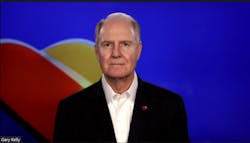Southwest Airlines CEO Foresees Recovery
The COVID-19 crisis took a massive toll on Southwest Airlines; it lost 70 percent of its total business and continues to see decreased demand in 2021. Gary Kelly, chief executive officer of Southwest Airlines, said the company plans for the industry to rebound soon and even added 17 new cities to its portfolio during the crisis.
Kelly said customer and employee health was Southwest Airlines’ main concern at the onset of the pandemic. The company’s first steps were to establish safety protocols, gather up PPE and make sure airports and airplanes were safe for travel. The company also worked with members of Congress and the previous administration to access funds to keep afloat.
“We were very busy raising capital and I guess just in relative terms, probably raised – in several months – about close to 20 years of financing in a 90-day time period, including the funding that we got from the federal government,” he said.
Southwest Airlines never had a layoff or furlough in its 50-year history and that philosophy continued during the COVID-19 pandemic. The company did offer voluntary retirement and time off programs, but it never furloughed its workers during the crisis. Southwest Airlines added 17 new cities to its portfolio during the pandemic to put its employees to work. Some of these cities include Myrtle Beach, SC; Eugene, OR; Bellingham, WA; and Miami, Florida.
“It is counterintuitive and I’m very grateful that we have opportunities to generate more customers, generate more revenue, reduce our daily cash burn counterintuitively in this environment," Kelly said. "We’ve got all these planes and we’re paying for them or have paid for them and they’re just sitting on the ground. So, it’s just costing us money. It’s an opportunity to tap into new revenue sources. New customers or even existing customers have new trips to take. But if you take a Dallas to Houston classic Southwest Airlines bread and butter market, it serves no purpose right now to add any flights in a fully mature market like that. These are all cities we that were on our list before the pandemic we just didn’t have the capacity to add them to our network. Now we do and there will be permanent additions and it has made a meaningful contribution in terms of reducing our cash burn.”
Southwest Airlines’ daily cash burn in the fourth quarter was between $10 and $12 million per day, according to Kelly. He noted this cash burn might increase as fuel prices continue to rise.
“In very rough terms that could be several hundred million dollars in and of itself for impact for the full year of 2021,” he explained.
Kelly said he thinks the worst impacts of the COVID-19 crisis are over for Southwest Airlines. He thinks people will start returning to travel in June when more people are vaccinated. People are becoming more comfortable with the idea of flying and, after being confined for so long, they want to start traveling again. Southwest Airlines will rely heavily on leisure travel as business travel demand might not recover right away. Kelly noted in a normal recession, business travel takes about five years to fully recover.
“[Overall demand] began to recover in May of 2020 and really leveled off in the June/July time period and haven’t moved much through the course of the last 10 months meaning we’ve been down roughly 65-70 percent very consistently over the time,” he said.
“I think as we get into the spring with the population getting vaccinated, we’re definitely seeing that people want to travel. We’re definitely seeing signs of life in terms of the bookings. You can see that in terms of the TSA statistics," he continued. "For the month of March, we’re still expecting that we’ll be down 60 percent more or less relative to 2019 levels. And while that’s a little better, I’m hoping that the train will continue to improve in April/May and really June is what we’re looking forward to.”
Southwest Airlines will continue to pursue other opportunities as it comes out of the pandemic, like improved sustainability. Kelly said Southwest Airlines has sustainability targets to achieve by 2050 and will make big strides to accomplish those goals.
“Southwest alone is more fuel-efficient by a factor of 50 percent just over the last 20 years. But to hit the kind of targets that we have as an industry for 2050, we’ll need to do much more. Sustainable fuels is one," he explained. "We don’t have adequate supplies of biofuels as one example to make a dent. And of course, that means you’re going to have very expensive cost as well. So we need to make a major commitment as a country, as a government, to make the volumes available and at the right price. I’m a believer that it’s certainly, over the life cycle of producing fuel, is more climate-friendly. I think at least 50 percent and maybe more.”
Kelly said he thinks there are opportunities for new forms of transportation like Urban Air Mobility (UAM) in the future, but it is still far away. He compared implementing UAM to that of the electric car market. The technology is available, it's just going to take some time until it's widely implemented.
“I think we need to be realistic that it won’t be an overnight success but all of those I think are very exciting opportunities for the future," he said. "If you took a little more tangible example about rail – high speed rail – we're in the transportation business and that is something that could be complementary. It could be ground transportation to smaller communities to bring them to airports. I think we just have to be mindful of the fact that with these ventures comes complexity and overhead and sort of a diluted focus.”
